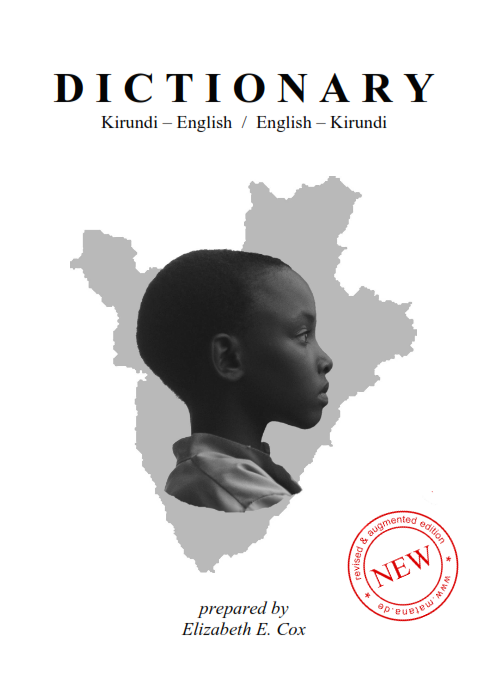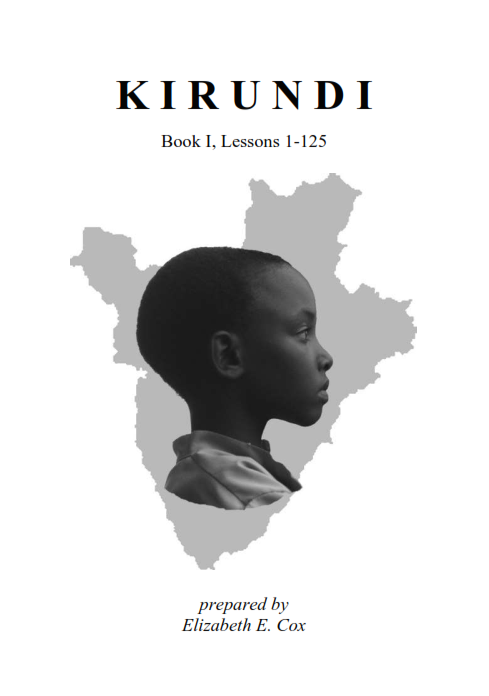fetish ▶ (bark cloth used as a thing of worship) indabe
(gourd used) intendēri
(heathen charm on head) urugori
(spotted barkcloth) indome
(things used in worship of Kiranga, thought to have special powers) ubuzimuzimu
(charm) igiheko
(gourd used) intendēri
(heathen charm on head) urugori
(spotted barkcloth) indome
(things used in worship of Kiranga, thought to have special powers) ubuzimuzimu
(charm) igiheko
En-En dictionary
kwītangira itama (-ītangiye) phr ▶ to put one's face in one's hands in deep thought
bury ▶ guhāmba
(a person) kuzika
(one's face in one's hans in deep thought) kwītangira itama
(a person) kuzika
(one's face in one's hans in deep thought) kwītangira itama
En-En dictionary
itama (ama-) 5 class 5
singular: i-,iri-
plural: ama- ▶ cheek
kwitangira itama put one's face in one's hands in deep thought
singular: i-,iri-
plural: ama- ▶ cheek
kwitangira itama put one's face in one's hands in deep thought
ubuzimuzimu 8 class 8
singular: ubu- ▶ 1. things used in worship of Kiranga, thought to have special powers, 2. spirit worship, 3. superstitions
singular: ubu- ▶ 1. things used in worship of Kiranga, thought to have special powers, 2. spirit worship, 3. superstitions
face ▶ amaso, mu maso
(in his face) mu maso hiwe
(to be facing each other) guhangana
(to make a ~ over something that tastes bad) kunyinyirwa
(to put one's ~ in one's hands in deep thought) kwitangira itama
(~ to ~) ubwāmāso, imbonankubone
(showing disapproval on one's ~) ibitsingotsingo
(in his face) mu maso hiwe
(to be facing each other) guhangana
(to make a ~ over something that tastes bad) kunyinyirwa
(to put one's ~ in one's hands in deep thought) kwitangira itama
(~ to ~) ubwāmāso, imbonankubone
(showing disapproval on one's ~) ibitsingotsingo
En-En dictionary
gukīmbūka (-kīmbūtse) v ▶ to express one's thoughts, to stick up for another
gusugurirwa (-suguriwe) v ▶ 1. to be cross, 2. to be offended, 3. to fight (after afterthought)
icīyumvīro (ivy-) 4 class 4
singular: iki-,ic-
plural: ibi-,ivy- ▶ 1. thought, consideration, 2. idea
singular: iki-,ic-
plural: ibi-,ivy- ▶ 1. thought, consideration, 2. idea
kurandamuka (-randamutse) v ▶ 1. to speak thoughtlessly, loudly, 2. to walk in one's sleep, to start up in one's sleep, 3. to come all together at call of trouble
kuvōgera (-vōgeye) v ▶ to walk in water, to go all through one's house, to know one's thoughts completely
hide ▶ (vi) gufuba, kwinyegeza, kwīhisha, kunyegera
(vt) guhisha, kunyegeza, kuzimanganya
(and wait for hunter, of animal) kuguba
(behind) kwīkīnga
(in a corner) kwīyagiriza
(oneself) kubūndabūnda
(one's thoughts) gufobeka
(the truth) kwiyobagiza
(to have nothing to ~) gutobora
(vt) guhisha, kunyegeza, kuzimanganya
(and wait for hunter, of animal) kuguba
(behind) kwīkīnga
(in a corner) kwīyagiriza
(oneself) kubūndabūnda
(one's thoughts) gufobeka
(the truth) kwiyobagiza
(to have nothing to ~) gutobora
En-En dictionary
know ▶ kumenya, -zi, kuzirikana
(another's thoughts completely) kuvōgera
(facts of a case) guhinyura
(for certain) kujījūka
(to not ~) kuyobera, kuyoberwa
(to not ~ what to do) mwījījānya, kurīgānirwa
(to try to ~ something) kugenzūra
(one who knows more than is expected of him) akagūgu
(another's thoughts completely) kuvōgera
(facts of a case) guhinyura
(for certain) kujījūka
(to not ~) kuyobera, kuyoberwa
(to not ~ what to do) mwījījānya, kurīgānirwa
(to try to ~ something) kugenzūra
(one who knows more than is expected of him) akagūgu
En-En dictionary
speak ▶ (speaking evil of another with whom you work) ikēba
(one who speaks with senseless repititions of words) ikirogorogo
(all speaking together) imvugarimwe
(to ~) kuvuga
(against) guhāririza
(carelessly) gufudika
(clearly) gufobōra, gutobekeranya
(distinctly) gutobora
(distinctly, not having been able to before) gutumbūra
(evil of one another) gucurikanya
(evil of) gukana, kunegura
(evil of the king) kurogota
(evil of a ruler) kuyoba
(fearlessly) kwūbahuka
(foolishly) kudebagura
(hatefully) gucobogoza
(hesitantlyusually used in negative) guhengēshanya
(in a mysterious language) gufobeka
(incoherently) kuvōvōta
(in someone's favor) gutēturura
(lightly) kujajura
(loudly) kurangurura, kurandamuka
(many words, usually quite meaningless ones) guhogōmboka
(sarcastically) kurtyekeza
(the truth) guhinyuza
(thoughtlessly) kurandamuka
(unwisely or rudely) kurofokwa
(very beseechingly) kubobōteza
(when one shouldn't) kuyogora
(where others hear voices but do not understand) guhwirima
(without arriving at point) kurerembuza
(to cause to) kuvuza
(to leave off speaking evil and speak kindly) kwigarura
(to prevent from speaking) guhwāmika
(give gift to bride so she will ~) guhorōra
(refuse to speak till given gift, as bride does) guhorōrwa
(one who speaks with senseless repititions of words) ikirogorogo
(all speaking together) imvugarimwe
(to ~) kuvuga
(against) guhāririza
(carelessly) gufudika
(clearly) gufobōra, gutobekeranya
(distinctly) gutobora
(distinctly, not having been able to before) gutumbūra
(evil of one another) gucurikanya
(evil of) gukana, kunegura
(evil of the king) kurogota
(evil of a ruler) kuyoba
(fearlessly) kwūbahuka
(foolishly) kudebagura
(hatefully) gucobogoza
(hesitantlyusually used in negative) guhengēshanya
(in a mysterious language) gufobeka
(incoherently) kuvōvōta
(in someone's favor) gutēturura
(lightly) kujajura
(loudly) kurangurura, kurandamuka
(many words, usually quite meaningless ones) guhogōmboka
(sarcastically) kurtyekeza
(the truth) guhinyuza
(thoughtlessly) kurandamuka
(unwisely or rudely) kurofokwa
(very beseechingly) kubobōteza
(when one shouldn't) kuyogora
(where others hear voices but do not understand) guhwirima
(without arriving at point) kurerembuza
(to cause to) kuvuza
(to leave off speaking evil and speak kindly) kwigarura
(to prevent from speaking) guhwāmika
(give gift to bride so she will ~) guhorōra
(refuse to speak till given gift, as bride does) guhorōrwa
En-En dictionary
thought found in: Kirundi I (Study lessons)
lesson 69 ▶ Possessive Particle –a Changed to –o
lesson 97 ▶ Adjective –he?
lesson 115 ▶ Prepositional Suffixes
lesson 124 ▶ Narrative Tenses II
thought found in: Kirundi II (Grammar)
chapter 3 ▶ Conditional Sentences – “if”
chapter 18 ▶ Optative Mood
chapter 23 ▶ Future and Negative Infinitives
chapter 24 ▶ “still” and “no longer” in the Past and Future
chapter 76 ▶ Affirmative and Negative Words











 printable PDF files.
printable PDF files.

 This unique dictionary by Betty Cox is known for the deep cultural insight it provides to many Kirundi terms. It has been thouroughly revised, adapted to present-day Kirundi orthography rules and many new words and meanings have been added.
This unique dictionary by Betty Cox is known for the deep cultural insight it provides to many Kirundi terms. It has been thouroughly revised, adapted to present-day Kirundi orthography rules and many new words and meanings have been added. The Kirundi self study course guides you through 125 lessons and makes you learn both the necessary vocabulary and basic grammar.
The Kirundi self study course guides you through 125 lessons and makes you learn both the necessary vocabulary and basic grammar. English pronunciation by
English pronunciation by


